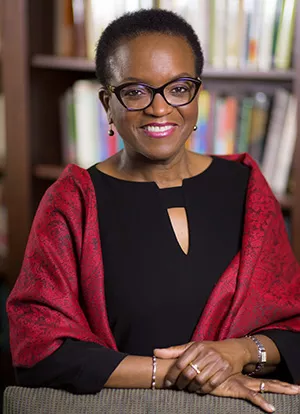President Smith Says Democracy is Under Duress

Forbes: Democracy Is Under Duress
This fall, Swarthmore College President Valerie Smith co-authored a column in Forbes entitled "Democracy is Under Duress" about the imperative need to get students involved in the upcoming election. Smith, along with President of James Madison University and Swarthmore alumnus Jonathan Alger '86, argues that the role of higher education is inextricably linked to fostering civic engagement among students.
"Some people portray the role of colleges as a private good, simply preparing students for the workforce," they write. "But our institutions are in the business of developing and disseminating knowledge, and instilling in our students the skills and abilities that enable them to contribute to creating a more just and inclusive democracy."
An excerpt of the column is below:
The fierce partisanship and polarization that too often paralyze our nation are on full display as we face historic crises—the COVID-19 pandemic, the related economic downturn, and the racial and xenophobic hatred and violence that continue to plague our country. History tells us that we cannot take democracy for granted; it demands effort and determination from every generation. It depends upon people who can engage in thoughtful, principled ways in the large challenges we face with the diversity of opinions around us and a sense of responsibility for each other. Institutions of higher education play a critical role in supporting its survival.
As the presidents of two quite different institutions—one a leading small private liberal arts college, the other a large public comprehensive university—we agree that higher education must build our students’ awareness, capacity, skills, and agency by giving them opportunities to engage in collective efforts to redress long-standing injustices and solve pressing societal problems.
Some people portray the role of colleges as a private good, simply preparing students for the workforce. But our institutions are in the business of developing and disseminating knowledge, and instilling in our students the skills and abilities that enable them to contribute to creating a more just and inclusive democracy. Those attributes—such as critical thinking, empathy, the ability to communicate and collaborate effectively, information literacy, resilience, ethical reasoning, active listening, and lifelong learning—have never been more important.
As we work to dismantle systemic racism and respond to a pandemic of tremendous ferocity and scope, we are employing our collective creativity to solve problems. By supporting assertions with lived experiences, evidence, and research, rigorous academic training can produce the thinkers and doers of the next generation who will tackle these and other hard and complex issues, from the climate crisis to economic inequality.
Higher education can also prepare students to participate in our democracy by exercising their right and duty to register and to vote. While college student voter participation in elections increased from the 2014 midterm election to the recent 2018 midterm election, less than half of college students made their voices heard by casting their ballots. According to the National Study of Learning, Voting and Engagement, voter turnout at more than 1,000 institutions increased by 21 points from 19 percent to 40 percent.
At Swarthmore College, we view participation in elections as a gateway to deeper engagement in civic life. The Swarthmore Get Out the Vote Committee works not only to register students to vote and apply for absentee ballots, but also to deliberate about major issues like racism and social justice, the economy, the public health crisis, and immigration. We believe our students bring long-term perspectives that are desperately needed in a public policy environment that is too often dominated by myopic political considerations.
Swarthmore College’s commitment to civic learning and democratic engagement is rooted in its Quaker history and values. Swarthmore’s Get Out the Vote Steering Committee—which includes students, faculty, and staff members—works to increase student participation in democracy through voter registration and turnout in all primary and general elections. The committee’s outreach activities include registering students at universal touchpoints, such as orientation; offering comprehensive voter registration training; the creation of “Voting Buddy,” and “Why I Vote” campaigns; and hosting virtual events, such as debate watching parties and Quizzo voting nights with faculty hosts. The committee also works with faculty to infuse conversations about voting into the curriculum.
Persistent racial injustice and the COVID-19 pandemic only exacerbate existing concerns about the fairness and integrity of the 2020 elections. As trusted voices with an educational mission, colleges and universities can serve as nonpartisan resources to provide accurate information, facilitate safe, secure, and full participation in democracy, prepare our students to address the issues our society faces and ensure students feel that Black lives matter on our campuses. And with recent elections giving rise to renewed and, at times, blatant efforts to suppress voter turnout and engagement, we must help our students understand fully their rights to exercise this civic duty.
There may be no more urgent or noble endeavor than ensuring our students—with their diverse and well-informed perspectives—fully participate in the election this November as we work to repair our faltering democracy.



